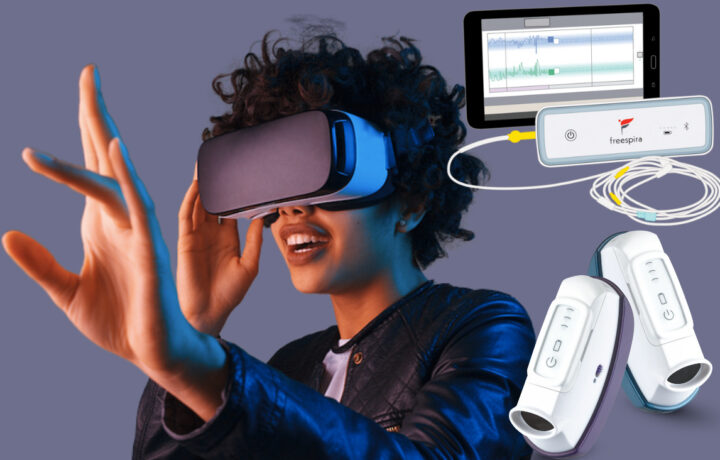Water, Motrin, repeat. During my time in the service, it felt like the only help that you could depend on from the docs was of the pharmaceutical type. Even for mental health issues, we were sent to talk to ‘the wizard’, or put on meds, and hope that this would solve the problem. These days, another pill is the last thing that we want.
Technology continues to advance, and medication is no longer the most effective, nor appropriate way to ‘fix’ our mental health. So, who should we talk to about non-medicinal options? For Veterans seeking non-medication options to manage stress, anxiety, depression, and PTSD, technology continues to expand what’s possible. Have you heard of the CalmiGo
Device? This handheld tool helps regulate breathing and promote calm, while looking like a simple inhaler, but it’s far from the only option available through the Department of Veterans Affairs.
Do Your Homework
While the VA doesn’t maintain a single public list of all ‘approved’ mental health devices, several are available to Veterans through VA procurement channels, clinical use, or home-based programs. Below are some notable examples helping Veterans improve their mental health and quality of life.
1. Vielight Neuro Devices
This device is a line of photobiomodulation (light-based) brain-stimulation devices that use gentle LED light to stimulate neural activity. The Vielight Neuro was selected by the VA’s Center for Compassionate Care Innovation for use in traumatic brain injury clinics.
Veterans can access the technology through VA procurement channels, with models like the Neuro Duo 4 and Neuro Gamma 4 + Vagus offering home-use versions. Early studies suggest benefits for cognitive function, mood, and overall brain wellness.
According to the Vielight website, research behind their devices showed decreased inefficient ‘crosstalk’ between functional brain systems, increased binding, and made connections stronger between brain networks, as well as prominent changes in networks of the brain crucial to attention, cognitive control, and sensory processing.
2. Freespira Breathing System
The FBS is FDA-cleared to treat panic disorder by ‘addressing dysfunctional breathing’, and PTSD symptoms. It retrains breathing patterns and normalizes CO₂ levels through guided sessions at home. According to the company, once a VA provider approves the treatment, the device is shipped directly to the Veteran’s home with ongoing remote clinical support.
How it helps: Veterans with PTSD or panic attacks report improved control of anxiety and fewer hyperventilation episodes after completing the program. According to the Freespira website, 91% of patients saw a reduction in symptoms 12 months post-treatment, 86% of patients reported being panic-attack free immediately after treatment, and 90% of patients would recommend the treatment to a friend or family member.
3. Transcranial Magnetic Stimulation
TMS is a non-invasive brain-stimulation therapy offered at over 60 VA facilities nationwide.
It uses magnetic fields to activate parts of the brain involved in mood regulation and is typically reserved for treatment-resistant depression. The VA is also studying its potential effectiveness for PTSD. This treatment is used ‘typically when other depression treatments have not been effective’.
How it helps: TMS can relieve depressive symptoms without medication side effects and has shown high success rates for Veterans when other treatments have failed. During the treatment, an electromagnetic coil is placed against the patient’s scalp, where it delivers a nerve-cell stimulating pulse in regions of the brain that control mood. The idea is to stimulate and enhance the brain’s ability to control various symptoms of depression. Senate testimony notes that TMS continues to expand across VA medical centers.
4. PsyTech VR Immersive Therapy
PsyTech offers a virtual-reality platform designed to help Veterans confront anxiety, trauma, and phobias in a safe, controlled environment. The system is now available to behavioral-health teams within the VA and can be integrated into therapy programs.
How it helps: Immersive VR therapy enables Veterans to engage with calming or therapeutic environments that simulate real-life challenges. This helps Veterans process trauma and build emotional resilience. Therapists can adjust the intensity, pacing, environment type, and level of exposure. This allows the program to be used at multiple stages of treatment.
PsyTech VR supports exposure therapy for not only PTSD, but also trauma-linked anxiety, phobias, OCD, and procedural fears. It also offers tools for relaxation, grounding, and emotional self-regulation.
5. CalmiGo
The CalmiGo is a small, handheld device that helps Veterans manage acute stress and anxiety through guided breathing and scent-based grounding. It resembles an inhaler to allow for a stealthy form of breathing relief during stressful moments. The device uses real-time feedback to slow breathing and promote relaxation in minutes, making it a discreet and easy-to-use companion for stressful situations.
The app is also very adaptable to and for the user, as well as gamifying the journey to mental health. The program offers ‘earning, creating, and customizing’ your own personal safe-space, tools for breathing, and even music and sound to create a tranquil experience for when you need a moment of escape.
The VA has recognized CalmiGo as a mental health tool that may be provided through some clinics and programs. It’s also available for individual purchase for Veterans who want a science-backed way to calm the body’s fight-or-flight response.
How it helps: CalmiGo helps regulate breathing, reduce cortisol levels, and create a sense of calm without medication or therapy sessions.
Important Notes for Veterans
“Approved by the VA” can mean several things, including but not limited to – available for use by VA clinicians, eligible for procurement, or suitable for home use under a provider’s supervision. Also, eligibility depends on diagnosis, provider recommendation, and local facility policy.
Veterans interested in one of these devices should ask their VA mental health provider about a durable medical equipment or prosthetics/auxiliary device consult to explore access options.
From light-based brain therapy to guided breathing systems and VR-assisted trauma treatment, the VA is integrating cutting-edge technology to improve Veterans’ mental health care. These innovations offer safe, science-based support that complements traditional therapy and medication, which empowers Veterans to take a more active role in their healing journey.




